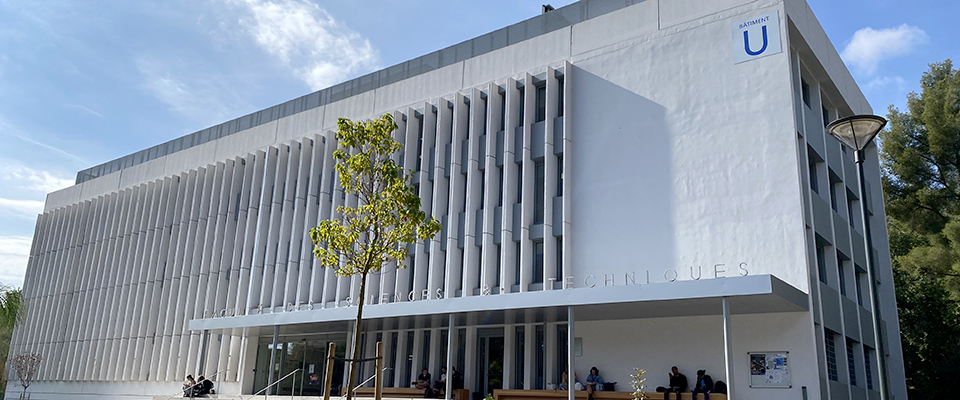Contents of the courses
3rd Semester
(C-A. Pillet) C* algebras: definitions, spectral analysis, representations and states; W* algebras: operator topologies, commutant; Tomita-Takesaki theory: modular operators, modular group.
(A. Novotny) Hilbert spaces, orthogonal projections, dual spaces and representation theorem, strong and weak convergence, weak topology, closed convex sets, Lax-Milgram theorem, Stampacchia theorem, compact operators, Fredholm theory, Sobolev spaces (density, continuous and compact injections, traces), second-order elliptic partial differential equations, variational formualtion, weak solutions, energy inequality, Fredholm alternative,
regularity of weak solutions, maximum principle, eigenvalues and eigenvectors, Galerkin method.
(S. Vaienti) Ordinary differential equations: qualitative study, complete study of linear systems in any dimension, classifications of equilibrium points, local stability of sinks, a simple versions of the Hartman-Grobman theorem, proof of the Poincaré-Bendixons theorem, flows on the torus, introduction to local bifurcation theory; Discrete dynamical systems: topological dynamics, orbits transitivity and non-wandering sets, invariant measures, Krylov-Bogolyubov theorem on the existence of invariant measures, recurrence and Poincaré theorem; Ergodicity and mixing: definitions and main properties;
Simple systems: irrational rotations, symbolic dynamics and sub shift of finite type,
Bernoulli and Markov maps with the corresponding measures, proof of invariance, ergodicity and (eventually) mixing for the preceding transformations;
Proof of Birkhoff's theorem: ergodicity of other simple systems like algebraic automorphisms of the torus and skew-systems; Introduction to the spectral theory of the Perron- Frobenius
operator; Entropy, Lyapunov exponents and dimensions: sketch the theory of entropy and Lyapunov exponents in dimension 2, introduction to fractal analysis and its links with dynamics; Statistical properties of dynamical systems: limit theorems, central limit theorem, large deviations extreme values theory, introduction to random dynamical systems.
(Y. Aubry) Finite fields: field theory, construction of finite fields, Wedderburn theorem, Frobenius endomorphism, factorisation of polynomials, cyclotomic cosets, equations over finite fields, Legendre and Jacobi symbols, quadratic reciprocity law; Algebraic geometry: projective spaces, smooth absolutely irreducible projective algebraic curves defined over finite fields, genus of a plane curve, rational points, zeta function, Riemann hypothesis, Serre-Weil bound.
(A. Panati) Compact operators, closed operators (closure), adjoint of a closed operator, selfadjoint extensions, Dunford calculus, Stone theorem, elements from spectral theory for closed (selfadjoint) operators, nature of the spectrum.
(P. Briet) Perturbation theory: caracterization of selfadjoint operators, relatively bounded and relatively compact operators. Kato-Rellich theorem. Spectral localization of selfadjoint operators : essential spectrum (Weyl's caracterization), discrete spectrum. Weyl's stability theorem. Theory of regular perturbations.
(T. Champion) We are interested in numerical analysis of convex optimization problem (with or without constraint) in infinite dimension. Existence results are proposed as well as algorithms to solve such problems.
Student seminar - 2 ECTS
In this seminar, each student has to present to the class a little chapter, research article or modelization problem proposed by one of the teachers of the classes.
Scientific english - 3 ECTS -- 18h
This class will focus on oral and written comprehension/production of English with a strong emphasis on oral interaction. Students will be asked to do an oral presentation connected with their field of study; this presentation will lead to a debate in English between students. Additionally, we will work on other scientific themes, mainly through the prism of video and written documents. Students are required to attend class and to actively participate.
Technics for job search - 1 ECTS - 10h
Course under the responsability of Service d’Accompagnement en Orientation et Insertion (SAOI).
4th Semester
This module is made of two parts, each devoted to a recent research topic of the research laboratories CPT and IMATH.
Applied analysis - 5 ECTS -- 20h
Geometric control
(F. Chittaro) Controlability, optimal control.
Mathematical physics - 5 ECTS -- 20h
Topological methods in quantum physics.
(J. Asch) Gauss Bonnet Theorem; Poincaré Hopf Theorem ; Fredholm operators; Toeplitz operators, Fritz Noether Theorem; spectral properties and transport; Topological transport; Unitary models on lattices.
The Master thesis has to be written within 4 months' time. You can choose your advisor from one of the two research labs CPT (located on the campus of La Garde and on the campus of Luminy inMarseille) and IMATH (located on the campus of La Garde), or from an exterior company.
Remark UE8
This compulsory UE, typically divided into two parts, consists of 40 hours. According to the two thematic orientations Mathematical physics and Optimization and applied analysis, the corresponding lectures may be shared with the Master Theoretical and mathematical physics, particle physics, and astrophysics (P3TMA) of Aix Marseille University, with the Master Mathematics of AixMarseille University and the University of Nice, and with the school of engineering SeaTech, respectively.
Remark Master Thesis (UE9)
The Master thesis has to be written within 4 months time. You can choose your advisor from a research lab of a University, generally one of the two research labs CPT (located on the campus of La Garde and on the campus of Luminy inMarseille) and IMATH (located on the campus of La Garde), or from an exterior company.

